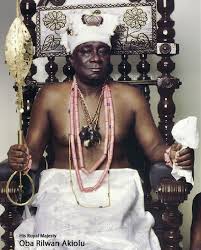Oba Akiolu and King Zwelithini: Different Persons, Different Subjects
I am shocked crapious that certain people are making strong and equivalent comparisons between Oba Akiolu and King of Zululand for recent ethnocentric utterances they have made. There is no comparison in their cases, personally and demographically. There are different logics to the utterances.
Oba Akiolu gave an inappropriate “warning” (that is already undergoing revision) to Igbos, an influential ethnic minority in Lagos, to vote one party against another or hell. He never, in his now embarrassing speech suggested to or incited his Lagosian subjects to cause any harm to the Igbos or non-Lagosians. The Lagosians were the very first to condemn the Oba in very direct terms for his statement and the political party he was canvassing for, All Progressives Congress (APC) disowned his utterances as ‘undemocratic’ and ‘totally unacceptable’. I am proud of how the Lagosians and South-Westerners handled the matter.
I even go further to say that in the evolution of the Lagos, South-Western and Nigerian polities and with the dynamics of traditional and state power, the Oba does not have the power or influence to start genocide or massacres against foreigners. Even if, for argument sake, the Oba wanted blood, his subjects would not give it to him.
There are an increasing number of Nigerians who are claiming, in the wake of the South Africa crisis that has led to the slaying and destruction of the assets of several foreign Africans living there, that if the People’s Democratic Party (PDP) had won elections in Lagos State and not APC which the Oba supported the same would have happened in Nigeria. Such notions defeat the purpose of democracy the possibilities of collective trust. How fair is it to malign a people for having collectively acted in good faith?
When the South-West (including Lagos) have engaged in violence for political or social reasons it has always been an ‘internal matter’ and never exacted on ‘foreigners’. How many non-South-Westerners would pack their bags and flee if there is crisis in Lagos or the South-West? I am not naïve enough to say such is impossible but from what is widely known about Nigerian history and what is conceivable, it is very unlikely. I remember Margaret Thatcher boasting that the ‘Miami Riots’ could not happen in the United then in no time the ‘Brixton Riots’ that spread all over metropolitan England occurred.
Unfortunately, ‘foreigner’ pogroms in Nigeria are typically associated with the North where even visibly devout non-Northern Muslims and their assets are attacked gratuitously and senselessly. Boko haram terrorism entrenches this observation. Violence in the North is dependent mostly on the Al-Majiri who are similar to the millions of “lost” and “left behind” South Africans who face unrelenting hopeless daily with occasional glimpses of hope that never materialise, among other things.
The Al-Majiri start as homeless virtual male child orphans who are separated from their families to ‘search for knowledge’ and end up in adulthood with all the psychic problems suffered by children who have endured abuse and constantly shifting uncertainty in their lives; they are easy cannon-fodder and foot-soldiers for violence. A responsible government should protect all children from ever having to encounter such experiences and ending Al-Majiri practices.
South Africa is now proven to be an “empty shell” of globalisation success and flowered with an ostensible image of Rainbow harmony, peace and prosperity. Unfortunately all flowers wither. This internal emptiness allowed Zulu King Zwelithini to use politically criminal utterances to upset the power dynamic of the state and cause wanton indiscriminate carnage against foreigners in a country “synonymous” with the saintly Nelson Mandela, according to Julius Malema, a South African MP.
King Zwelithini incited his people to crapiously expel foreigners who were ‘dirtying the streets’ of South Africa without a deadline or method resulting in a ‘melee’. The carnage is most evident in Zulu strongholds in South Africa, King Zwelithini asked for blood (and fire) and his people gave it to him.
So where does the comparison between Oba Akiolu and King Zwelithini or Lagosians and Zulus emerge from?
The major difference between South Africa and Nigeria in governance is mostly political maturity. Nigeria has a 40-year head-start over South Africans and it shows. The maturity I speak of here is not in terms of actual good governance but that of the sensibilities of the people. Nigerians should keep it that way.
Grimot Nane
Discover more from Grimot Nane Zine
Subscribe to get the latest posts sent to your email.

